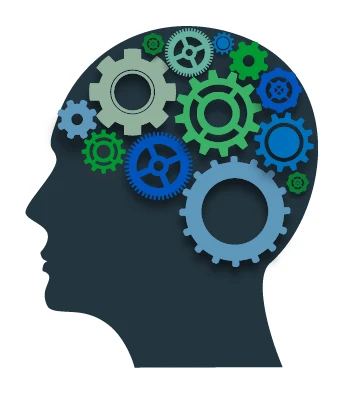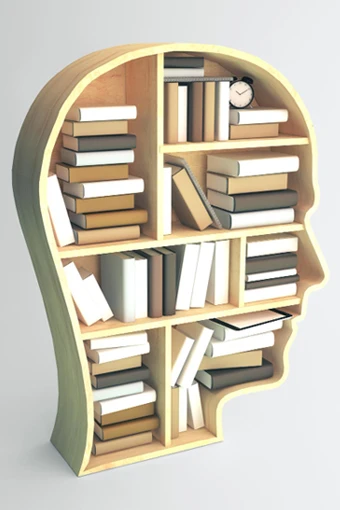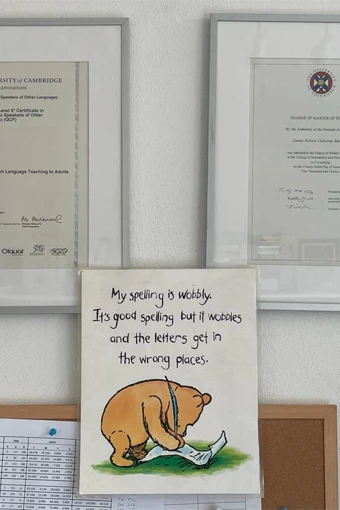October 2023 has been declared Dyslexia Awareness month. Dyslexia is a hidden disability; it can be difficult to diagnose. A dyslexia diagnosis is also a complex process of testing and evaluation. Dyslexia is measured on a scale from Mild to Severe. A diagnosis will place you on the spectrum. I will not purport to be an expert, I am just a ‘proud’ badge wearer.
As a hidden disability, there are no physical manifestations. Consequently, people tend to be far less sympathetic to the unseen. It’s not unusual for dyslexic people to be ridiculed by being called “lazy” or “sloppy.” The ridicule and lack of sympathy is soul destroying. I can assure you, that the time and effort that the dyslexic person puts in to get everything perfect is unmeasurable. Dyslexic people have all battled through the ‘system’. However, we’ve found coping mechanisms to go undetected, these are called our superpowers. If you can tap into our superpower and help us with our weaknesses, then we’re going to be some of your greatest assets. Here is my story and my battle with Dyslexia.
My Diagnosis

I remember the parents’ evening when my History teacher asked if I’d been tested for dyslexia. My mum was relieved that finally, someone else had seen what she had been saying. Despite being 16 I had struggled through school, but no one had pinpointed the problem. Following that parent-teacher conference, I was quickly assessed by the Dyslexia Institute. I was formally diagnosed as being on the border between Mild and Moderate dyslexia.
For me, Dyslexia manifests itself in two forms. My short-term memory capacity is less than the average person. This means that if there is a lot of information hitting me all at once I will struggle to remember most of it. The second manifestation is in how I hear or “mishear” certain sounds. This means that I struggle with reading and spelling. Childhood was not fun learning to read with these added unidentified challenges. My mum would sit me down every night after school and help me read. Her persistence and perseverance in helping me learn to read was my salvation. It was a struggle, at age six, she would help me read through a book. Sounding out the words and repeating them, to the point that I was word-perfect by the end of the evening. However, the next evening the same book and the struggle began again, I’d forgotten everything.
To these ends: my reading is slow; my spelling can be seriously challenging at times; reading out loud can be tedious; Language acquisition is seriously hard work.
From audible problems to fast alternative thinking
You’d think that modern technology can solve the problem. I’ve been told I am a very articulate person. People don’t struggle with my accent; I don’t really have an accent. Yet voice recognition software continues to fail me. I’d love to be able to dictate my thoughts to paper. The problem with hearing and verbalising certain sounds often results in many inaccuracies.

What about a spell checker then? Let me be clear, a spell checker is not always a dyslexic person’s best friend. In my situation, a spell checker can help about 75% of the time. When I misspell a simple word or use the wrong spelling for a similar-sounding word. However, more complex words can be a big problem. I struggle with spelling words that use specific sounds. I’d be very rich if I had a euro for every hour I’ve wasted trying to figure out how to spell these words. Despite an internal combinatorial approach to altering spellings, there are times I just have to give up. At which point my brain’s inbuild thesaurus kicks in. I am thinking fast to try and substitute the word with another that won’t destroy meaning.
I’ve found that learning to replace words, has led me to think about an alternative way to express my ideas. I honestly, thought it was normal for people to be able to think from different perspectives. To be able to explain challenges and solutions from different viewpoints. It turns out, this is a superpower that works well with training and teaching. Helping people understand complex ideas is never a one-size-fits-all. Being able to express the complex ideas from different perspectives is powerful. Being able to do it on the fly and at speed, just helps ensure it’s current and relevant.
Being aware that this approach is beneficial I can be more empathetic with a range of learners.
How did slow reading and short-term memory become a superpower?
I hated silent reading at school. Actually, I hated reading full stop. It’s something I had to do, particularly so I could complete my studies. I detest the fact that I must concentrate hard on every word, trying to understand what the author is saying. With limited short-term memory, this is a challenge because I can get to the end of a sentence and could be totally lost. However, once it passes to long-term memory it’s pretty firmly in there.

Long-term memory is one of my superpowers. During the summer between lower and upper sixth (Grades 11 and 12), I focused hard on my Chemistry studies. Dr Black had given us 24 double sided closely typed definitions we should learn by heart. To this day I can rattle off many of them. “A mol is an amount of substance equivalent to 12 grams of carbon-12 at standard states and conditions.” I can even tell you what standard states and conditions are and why they matter. I know it’s a bit more of a party trick with my former classmates than something terribly amazing. However, it is still something I can do, that most of them can’t.
I’d assumed that everyone comprehends what they read as profoundly and deeply as I do. Why wouldn’t they? After talking to my cousin, who is also dyslexic, it transpires this is one of our superpowers. Reading slowly and committing more to long-term memory has its benefits. Understanding sub-text and subtlety turns out to be far easier to spot if you read everything word for word. At the same time, I find I can recall with fairly good accuracy things I’ve read in the distant past. As I have naturally built a stronger long-term memory, I am often able to make connections to distant ideas. Of course, I assume this is normal for everyone, but it turns out not everyone can do this as well.
Overcoming Writing Problems

Despite these amazing superpowers, I still struggle with expressing myself. A poster I’ve always had by the side of my desk depicts Pooh bear. Pooh is writing, “My Spelling is wobbly. It’s good spelling but it wobbles, and the letters get in the wrong place.” For me, this happens with letters, words, and thoughts, they tend to get jumbled up.
I’ve not always been as open and honest about my Dyslexia. In Education, there is a terrible dichotomy between student support and teacher support. Students with dyslexia are actively helped and supported. While teachers with dyslexia are expected to “sort it out!” At times, I was made to feel inferior because I had dyslexia, so I often hid it. I took great pride in trying to write meaningful honest reports for my students. Sadly, they’d often come back with big red lines through them, and comments like try and do better. The worst offender was the Head of School, who always implied his disappointment. “James you’re so intelligent, how can you write such dribble at times.” I can tell you it was soul-destroying. For this reason, as a teacher, I ended up hating writing school reports. Heartbreaking because teaching the thing I loved and was good at had so many obstacles.
I have found solutions to make my voice clearer. It takes time and effort; I have a two-pass system that seems to catch most of the mess and helps me re-write the worst parts. I utilize HemingwayApp to re-write the cumbersome long-winded waffle. I then use Word to catch the spelling and grammar errors. It can still be disheartening to put your all into a great long blog post only to discover it’s cumbersome to read. I hope you’ll agree that what you’ve read today was fairly painless.
Key Thoughts
I’d love you to take away a few key lessons from my story:
- Dyslexia is a hidden disability, we can’t get better from it, but we can adapt and cope.
- Society doesn’t see our daily struggle where we try to ‘be normal’. We don’t have an outward sign that says, this person is struggling to do what you would do, even in double the time.
- Your own poor spelling and grammar is not always a sign of dyslexia, please don’t use it as an excuse. When you do, you belittle those of us who have the disability.
- As with all people with disabilities, dyslexic people have created coping mechanisms. These coping mechanisms are our superpowers. If we don’t know what they are yet, please take more time to point them out and praise them. We’ve been knocked down enough.
- We don’t need sympathy, but we might need support and a level of compassion and understanding.
- We’ll be dedicated and committed and will always produce work of a high quality. To get the best out of us, some of us may need some extra help from time to time. A proofread of an important document can be helpful. However, please use that red pen sparingly.
- Finally, please take time to understand the support that each of us needs. Understand where we have solid coping mechanisms and where we could still use help. Please don’t expect technology to have all the answers.